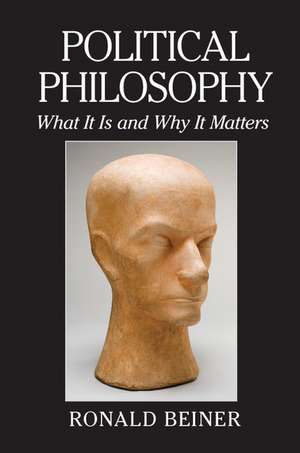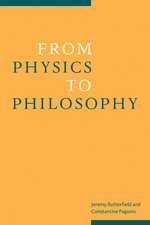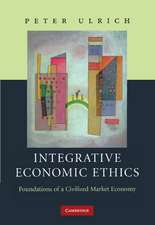Political Philosophy: What It Is and Why It Matters
Autor Ronald Beineren Limba Engleză Paperback – 10 aug 2014
| Toate formatele și edițiile | Preț | Express |
|---|---|---|
| Paperback (1) | 224.24 lei 43-57 zile | |
| Cambridge University Press – 10 aug 2014 | 224.24 lei 43-57 zile | |
| Hardback (1) | 661.56 lei 43-57 zile | |
| Cambridge University Press – 10 aug 2014 | 661.56 lei 43-57 zile |
Preț: 224.24 lei
Nou
Puncte Express: 336
Preț estimativ în valută:
42.91€ • 44.92$ • 35.50£
42.91€ • 44.92$ • 35.50£
Carte tipărită la comandă
Livrare economică 07-21 aprilie
Preluare comenzi: 021 569.72.76
Specificații
ISBN-13: 9781107680555
ISBN-10: 1107680557
Pagini: 304
Ilustrații: black & white illustrations
Dimensiuni: 150 x 226 x 18 mm
Greutate: 0.41 kg
Ediția:New.
Editura: Cambridge University Press
Colecția Cambridge University Press
Locul publicării:New York, United States
ISBN-10: 1107680557
Pagini: 304
Ilustrații: black & white illustrations
Dimensiuni: 150 x 226 x 18 mm
Greutate: 0.41 kg
Ediția:New.
Editura: Cambridge University Press
Colecția Cambridge University Press
Locul publicării:New York, United States
Cuprins
1. First prologue: horizons of political reflection; 2. Second prologue: Freud, Weber, and political philosophy; 3. Hannah Arendt: the performativity of politics; 4. Michael Oakeshott: life's adventure; 5. Leo Strauss: the politics of philosophy; 6. Karl Löwith: in awe of the cosmos; 7. Excursus on nature and history in the Strauss–Löwith correspondence; 8. Eric Voegelin: modernity's vortex; 9. Simone Weil: the politics of the soul; 10. Hans-Georg Gadamer: philosophy without hubris; 11. Jürgen Habermas: politics as rational discourse; 12. Michel Foucault's carceral society; 13. Alasdair MacIntyre: fragmentation and wholeness; 14. Short excursus on the rise and decline of communitarianism as a political philosophy; 15. John Rawls and the death of political philosophy; 16. Richard Rorty: knocking philosophy off its pedestal; or, the death of political philosophy postmodernized; 17. Epilogue: on not throwing in the towel.
Recenzii
'In this extraordinarily learned, clear, and wide-ranging book, Ronald Beiner analyzes the contributions of twelve leading thinkers of the twentieth century to political philosophy, from Arendt to Rorty, Strauss to Foucault, and Oakeshott to Rawls … every reader, I believe, will be impressed by the humane seriousness that beats at the center of this impressive book, which seeks not to score points but to understand, eschewing scholarly quibbles in favor of the central question of the human good. Beiner makes for an outstanding guide through the intellectual life of the modern era.' Robert C. Bartlett, Boston College
'A terrific book - beautifully written, elegantly argued, wise, passionate, and personal - that both succinctly summarizes the compelling visions of twelve writers and defends their commitment, acknowledged or not, to the idea that properly 'epic' political philosophy should offer an ideal of the good life. Beiner makes a persuasive case for the view that inspiring and substantive political philosophy was not dead before the arrival of Rawls but very much alive and responsive to the crisis of modernity provoked by the tragedies of the past century.' Dave Archard, Queen's University Belfast
'[Beiner] examines concepts and systematizations regarding esotericism, performative politics, the common good, and communicative rationality, among others. Furthermore, he does so in an accessible, nearly jargon-free, discursive style with detailed knowledge and intelligent discussions of the twelve theorists. The quality of Beiner's intellectual presence affirms his own right to occupy a thirteenth place in this volume of political philosophy. Summing up: highly recommended.' J. R. Pottenger, Choice
'A terrific book - beautifully written, elegantly argued, wise, passionate, and personal - that both succinctly summarizes the compelling visions of twelve writers and defends their commitment, acknowledged or not, to the idea that properly 'epic' political philosophy should offer an ideal of the good life. Beiner makes a persuasive case for the view that inspiring and substantive political philosophy was not dead before the arrival of Rawls but very much alive and responsive to the crisis of modernity provoked by the tragedies of the past century.' Dave Archard, Queen's University Belfast
'[Beiner] examines concepts and systematizations regarding esotericism, performative politics, the common good, and communicative rationality, among others. Furthermore, he does so in an accessible, nearly jargon-free, discursive style with detailed knowledge and intelligent discussions of the twelve theorists. The quality of Beiner's intellectual presence affirms his own right to occupy a thirteenth place in this volume of political philosophy. Summing up: highly recommended.' J. R. Pottenger, Choice
Notă biografică
Descriere
Ronald Beiner focuses on twelve prominent twentieth-century philosophers and employs critical dialogue to clarify their intellectual contributions to the field of political philosophy.











